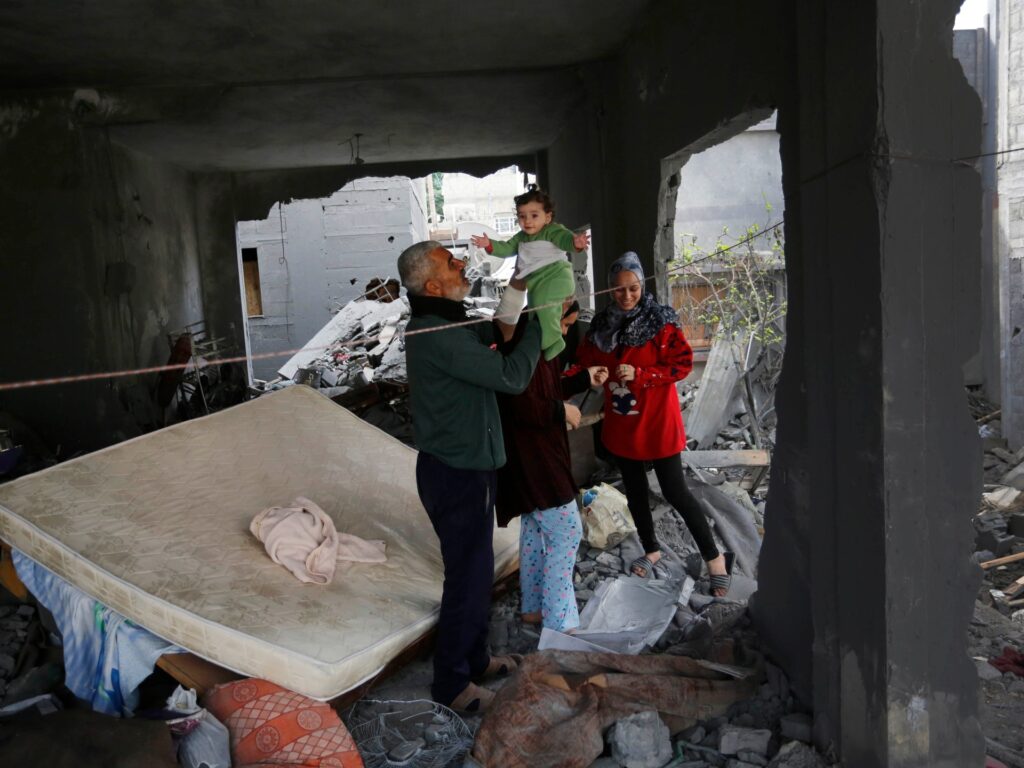Deir al-Balah – On the third day of the Israeli offensive on the Gaza Strip, Siham Naji was sitting across from her husband Khaled in their living room when she remembered to take her daily medication.
She walked to the kitchen and opened the refrigerator door to get some water. The next second, she found herself in hell.
“I was knocked to the ground and felt something hot on me,” the 48-year-old said. The air around her had darkened and filled with dust, the sounds of destruction ringing in her ears.
An Israeli missile hit his neighbor’s house, razing it to the ground and damaging Naji’s house.
Siham shouted her husband’s name several times before hearing his shallow, labored breathing.
Crawling on her hands and knees, she returned to the living room and saw the lower half of Khaled’s body buried under the rubble. Blood was flowing from his mouth.
His son Mustafa lay in his room in shock, thinking he had lost all feeling in his body.
Eventually, mother and son managed to free Khaled from the rubble and the three emerged from their ruined home, injured but alive.
“My own palace”
The Naji family home, where 15 members resided, was a labor of love – Khaled had built it himself over the years. It had two living rooms, three bedrooms, a kitchen, a large bathroom and a partially furnished apartment for his married son on the second floor.
“It was like living in my own palace,” Khaled, 51, said. “My whole life and dreams were in this house.”
“I was building a balcony overlooking the garden,” he added. “I was planning to make a small swimming pool for the younger children in the summer.”
A day after the attack, Khaled returned to see the damage to his beloved home.
“All these years of work have gone into building this house with my own hands, with the help of my wife,” he said. “I mixed the concrete, designed the layout and chose the best furniture.”

The family had been informed that a house in their neighborhood would be targeted, but they did not know which one.
For about 10 days, the family tried to shelter in a school but found the conditions unbearable. “There is no water, no electricity, no privacy,” Siham said. ” There are a lot of people. So we went to Al-Aqsa Martyrs Hospital, but the situation there was more or less the same. »
The Naji family decided to return home and live among the ruins, seeing this as a better option. After removing the rubble from a room and cleaning it as best they could, they laid down mattresses to sleep on. The room had no doors or windows.
“Where else would we go, on the streets under a tarpaulin? Khaled asked rhetorically. “So that if my children don’t die in an Israeli attack, they will die from the cold or from one of the diseases that broke out? I prefer to die with dignity at home rather than live in a tent.
Hope of reconstruction
According to the Gaza Ministry of Public Works and Housing, Israeli bombing has damaged more than half of all residential units – more than 222,000 homes – in the Gaza Strip. At least 40,000 houses were completely destroyed but the ministry has not been able to update these statistics since November 6, when it collapsed.
The Naji house, now in ruins, is strewn with debris. Metal pipes protrude from the broken concrete and there are gaping holes where walls once were. The kitchen has remained largely intact. Through a small corridor, past the damaged washing machine, is the room where the family sleeps.
Layan Naji, 15, hangs hand-washed laundry on ropes tied above the ruins.
“The room we sleep in gets very cold,” she said. But she is grateful that her seven-year-old cat, Sondos, survived the Israeli air raid.
“I thought I lost Sondos and I was so happy when my dad found her,” she said. “She always sleeps at my feet.”
As all their bedding was lost, her mother had to borrow a blanket and pillow from a neighbor.
“My daughters hang out in the room but I need space, so I sit alone with my hand on my cheek,” Siham said. She thinks especially of their ruined garden, where there were guavas, fig trees, lemon trees and date palms.
“I loved our garden,” she says. “We were sitting there, drinking tea and talking. I hope we can rebuild our house and make it even better than before.

